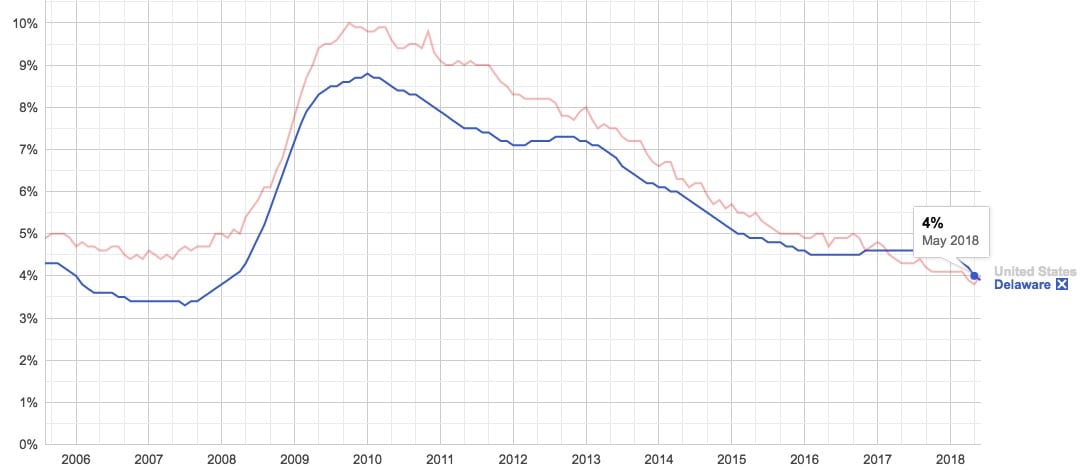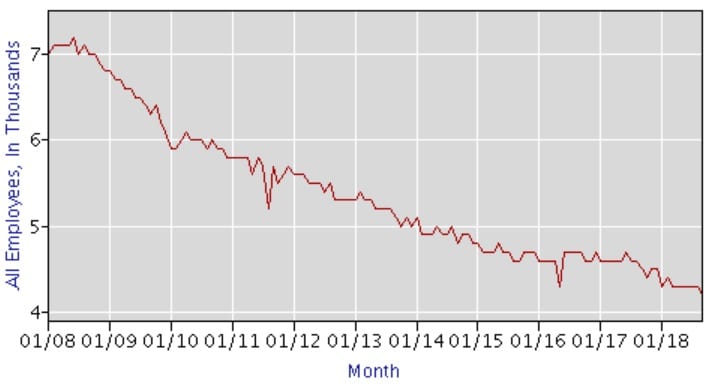Cerron Cade sees himself as somewhat of a farmer.
Like any farmer worth their salt, Delaware’s Secretary of Labor is trying to care after both the fruit and the seeds that will one day get there. In his role as head of the state government agency overseeing employment and workplaces, he’s keen on following the earliest signs of economic growth.
Typically startup growth is the area of DEDO, the state’s economic development arm charged with business attraction and retention. But the economic pie of Delaware, long associated with big corporate outposts, needs updating. For example, in August, Cade was part of an employment campaign with advertising startup Carvertise.
“We need to pay attention to the seeds,” said Cade, speaking to 75 small business owners and the like during a fireside chat held by Technical.ly during Delaware Innovation Week at the riverfront headquarters of the New Castle County Chamber of Commerce. Once a college football player for Delaware State University, Cade can be imposing, but he earned laughs and looked comfortable speaking to both established small business owners and a younger startup founder
In a small state with just 460,000 jobs, tiny acts can have enormous outcomes. You already know the history: Delaware’s origins in chemical sciences, celebrated corporate law and historic legislation launching a financial services industry.
State boosters cheer one million incorporated businesses (in a state with a population of just 900,000), including the majority of the Fortune 500. But that represents noisy data: the majority of those companies incorporating in Delaware have no offices here, which means limited economic impact.

Still, tracking against national trends, the Delaware unemployment rate is low, nearly at its pre-Great Recession low according to U.S. Bureau of Labor Statistics data.
So, if you’re Cade… where do you go from here?
Do you double-down on the corporate behemoths who are here — celebrating the Delaware Technology Center from JP Morgan Chase and its tech talent pipeline? Or do you dive into the classic small business cheerleading that is a bedrock of most local economies?
For Cade it’s “not ‘either or’ but ‘both and.”
“Delaware is too small to be choosy,” he said. But the state needs to invest in its future.
Consider the state’s bid for Amazon’s sprawling HQ2 project — which Cade has thoughts on. Delaware legislators were hopeful for the Philadelphia bid because, as Cade reported, Amazon site-placement officials are prioritizing most “who they’re going to hire and how they’re going to get to them to work and back home.”
So it’s about both talent and transit. Not either or.
Delaware is an educated place, with one study putting Delaware in the Top 5 when it comes to average university quality. But the state’s IT sector employment ranks have been declining for years, according to the BLS. This fall, there are just 4,300 people employed in Delaware in the information technology sector, the primary BLS distinction for tech jobs, including software and data science. If you’re keeping score, that’s down from 7,000 as the Great Recession took hold in 2008.
The sectors with the biggest growth in employment in the last year have been in professional services (yes, those pesky lawyers and accountants), hospitality (like restaurants and tourism) and construction.
(It goes without saying, but Amazon doesn’t have a vast, ongoing need for construction talent.)

That IT sector decline is in parts thanks to the rise of of tech workers in companies across more and more sectors. But there are other daunting challenges, namely concentration in other industries that aren’t growing, like financial services. Suppose, for instance, that Barclaycard relocates its Wilmington tech team to their New Jersey campus, or Capital One focuses tech team growth in its Virginia offices, rather than Delaware.
Delaware has made strides in transit. The Wilmington Amtrak station is a beacon of urban promise for an otherwise suburban state. Improved SEPTA transit through the state is a bedrock of the case for keeping close ties to Philadelphia. DART soldiers on.
Backed by hopes for a $40 million regional rail center near the site, Cade was gleeful about the idea of Amazon landing on the site of the former Claymont steel mill. It would introduce a seductive transformation narrative, for sure. But Cade said Amazon site assessors brought up concerns on limited infrastructure investment.
With questions on tech talent retention and signs of traffic congestion already, someone in an economic development role like Cade might start worrying about his fruit trees. Because a tiny state like Delaware can’t buy its way out of the problem, by, say, forgoing $4.1 billion to lure an international manufacturing powerhouse.
“We’re never going to be the biggest check,” said Cade, looking out into the crowd in his jeans and blazer. “But they always say we have a lot of passion.”
Without the funds, the farmer must tend to the seeds.
Cade is bullish on rethinking apprenticeship programs. He wants to rethink unemployment insurance with the gig economy capturing Delaware’s economy — including homegrown Delivery Circle. After Cade’s Delaware Innovation Week interview, he lingered, speaking to a dozen or more entrepreneurs and small business owners, as they hurriedly handed them their business cards.
Cade said to the crowd: “We need you all to grow.”







